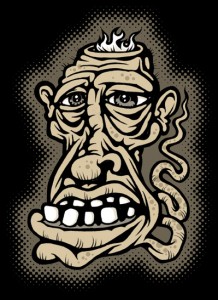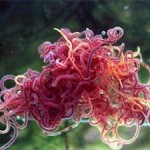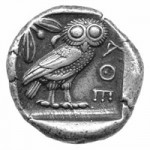Does Fate reflect a wormish agenda? We looked at aspects of this question in the last two posts. Read on for even more sinister developments.
Once upon a time within some dimension or another, a species of worm with an interesting civilization embraced a complex body of beliefs, not all of them consistent with one another, but that is in the nature of things.
Their consciousness, if we may call it such, was a collective phenomenon; taken individually, these worms were rather dull. Be that as it may, one of their collective beliefs was that human beings, being highly nutritious, were the best food they could eat. More than that, however, tradition had it that, if one regularly consumed sufficient quantities of people meat, one could become as wise as a human being. Here again, of course, we speak of the collective, for individual worms would always be relative blockheads, in the final analysis.
Marvelous are the ways of evolution. This worm, a species of the ubiquitous pinworm (Enterobius spp.), was among other things a parasite specializing in human beings. It employed a so-far unidentified stealth strategy to conceal itself during the lifespan of its host. Then, at the moment of the hosts’ death, it employed some unknown mechanism to morph, passing itself off as a blowfly or, where appropriate, some other insect larva. A maggot. Why it would have evolved this capacity remains a mystery. Why would it be important to appear a newcomer at the death of a host, rather than a resident adopting new behavior? If this represented a response to some pressure from its environment, what conceivable threat could that have been? (The alert reader may ask how it is the narrator does not know this, yet purports to understand features of the worms’ belief system. To answer that question would be to reveal too much.)
In any case, over the millennia this protean worm, essentially a superorganism, learned that people were nutritionally superior — and tastier, if collective consciousness may be said to appreciate such things — if they died in a state of stress, organs and meat nicely conditioned by the flood of assorted hormones associated with such emotions as fear, anger, lust and envy. Over quite a long time, then, this worm evolved a special parasitical relationship with human beings. Truly astonishing are the ways of nature. Here we had a worm fed and sheltered by a human host upon which, following its death, the worm, disguised as a maggot, would feast. Driven both by gluttony and by its desire for transcendent wisdom, the worm eventually evolved neuro-chemical means of inflaming all the appropriate human emotions needed in turn to drive vastly accelerated reproduction and subsequent slaughter, an ever more generous cornucopia of prime organs and meat for the worm’s dining pleasure and, it believed, ultimate enlightenment.
But humans were smarter than they were wise. Suitably inflamed, they developed more and more catastrophically violent ways of resolving conflict at the same time they learned to enjoy promiscuous lust without spawning the offspring that had in times past required so much care and feeding. The worm feasted beyond its wildest imagining, yes, but ultimately the boom proved unsustainable.
Certain traditions, in certain dimensions, hold that the worm did in fact finally achieve full human wisdom. That would have been around the time the humans themselves wised up. Which was just too late. Alas.
 But many are the dimensions, many of them inhabited by worms and people, and many are the surprises nature cooks up for our edification and, sometimes, our amusement.
But many are the dimensions, many of them inhabited by worms and people, and many are the surprises nature cooks up for our edification and, sometimes, our amusement.
Moral of this story: No matter how wise the collective, individual worms will always be blockheads. (Evidence, notably recent political behavior in the USA, suggests the converse is true among human beings.)
Thanks to Von Glitscka for permission to use his Doodle Creature (above).


You are truly the weirdest guy I know. (That’s a compliment by the way.)
And I take it as such. (I’m only afraid you’re just saying that to make me feel good.)